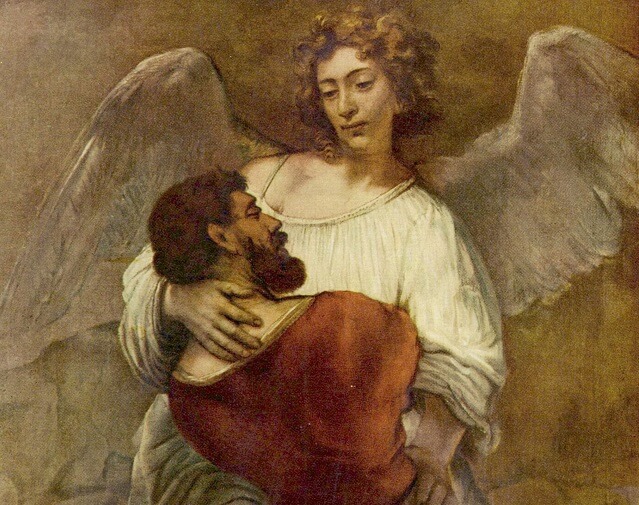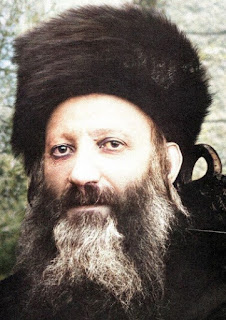“ Yaakov remained alone. A stranger wrestled with him until daybreak. When he saw that he could not defeat him, he touched the upper joint of [Yaakov's] thigh. Yaakov's hip joint became dislocated as he wrestled with the stranger.” (Ber. 32:25-26)
What is the significance of this unusual wrestling match? Why did Eisav's angel decide to injure Yaakov's thigh, and not some other part of his body?
Eisav's World of Hedonism
Many years earlier, Eisav chose to reject his birthright, selling it for bowl of lentil stew. “I am going to die!” he exclaimed. “What good is a birthright to me?” (Ber. 25:32) Why did Eisav sell his birthright?
We must understand the significance of this birthright. It was a legacy from their father Yitzchak, a charge to live a life dedicated to serving God. For Eisav, holiness was completely divorced from living a normal life. He saw the birthright as a death sentence, threatening the very foundations of his hedonistic way of life. It was because of his birthright that Eisav felt that he was going to die.
Eisav's viewpoint is expressed a second time during his reunion with Yaakov. When Eisav saw Yaakov's family, he was amazed. “Who are these to you?” (Ber. 33:5) You, Yaakov, who chose our father’s birthright and its otherworldly holiness — what connection can you have to a normal life? How can you have wives and children?
Eisav was unable to reconcile his image of a holy life of Divine service with establishing a family and raising children.
Eisav's guardian angel, in his nocturnal struggle with Yaakov, embodied this outlook. Where did the angel attack Yaakov? He went for Jacob’s thigh, dislocating it. His message was clear: if you wish to dedicate yourself to holiness and God, you must divorce yourself from family and all other aspects of a normal life. Your thigh, from where your children issue, must be detached from you.

Illustration image: ‘Jacob Wrestling with the Angel’ by Rembrandt (1659)
Yaakov's Elevated Torah
Yaakov did not accept Eisav's views on living a holy life. Yaakov exemplified, in both outlook and life, the harmony of nature with holiness. And Yaakov's Torah was revealed in the natural world.
The Midrash states that “The Holy One looked inside the Torah and created the universe” (Bereisheet Rabbah 1:1). In other words, the universe is a direct result of God’s contemplation of Torah. If we examine the world carefully, we should be able to uncover the foundations of the Torah. Had Adam not sinned, there would have been no need for a written Torah. Life itself would be ordered according to the Torah’s principles.
The Avot sought to repair Adam’s sin. Their Torah and mitzvot belonged to the era before the Torah needed to be written down. For them, the Torah was naturally revealed in the universe. This is also the Torah of the angels, whose sole function is to fulfill the mission of their Creator in the world. “Bless God, His angels, mighty in strength, who fulfill His word” (Tehilim 103:20; see Shabbat 88a).
Who were the messengers that Yaakov sent to inform Eisav of his arrival? The Midrash teaches that Yaakov sent angels (Bereisheet Rabbah 72:4). A messenger takes the place of the sender; it is as if the sender himself accomplished the mission. Thus, the sender and the messenger must be connected on some basic level (see Kiddushin 41b).
By utilizing these unusual emissaries, Yaakov was sending a powerful message to Eisav. You, Eisav, claim that holiness and physical life are fundamentally contradictory. But my Torah is the Torah of the angels. For me, there is no division between holiness and the natural world. God Himself is revealed within His creation.
(Adapted from Shemuot HaRe’iyah 9, VaYishlach 5630 (1929), by Rav Chanan Morrison)
Yaakov did not accept Eisav's views on living a holy life. Yaakov exemplified, in both outlook and life, the harmony of nature with holiness. And Yaakov's Torah was revealed in the natural world.
The Midrash states that “The Holy One looked inside the Torah and created the universe” (Bereisheet Rabbah 1:1). In other words, the universe is a direct result of God’s contemplation of Torah. If we examine the world carefully, we should be able to uncover the foundations of the Torah. Had Adam not sinned, there would have been no need for a written Torah. Life itself would be ordered according to the Torah’s principles.
The Avot sought to repair Adam’s sin. Their Torah and mitzvot belonged to the era before the Torah needed to be written down. For them, the Torah was naturally revealed in the universe. This is also the Torah of the angels, whose sole function is to fulfill the mission of their Creator in the world. “Bless God, His angels, mighty in strength, who fulfill His word” (Tehilim 103:20; see Shabbat 88a).
Who were the messengers that Yaakov sent to inform Eisav of his arrival? The Midrash teaches that Yaakov sent angels (Bereisheet Rabbah 72:4). A messenger takes the place of the sender; it is as if the sender himself accomplished the mission. Thus, the sender and the messenger must be connected on some basic level (see Kiddushin 41b).
By utilizing these unusual emissaries, Yaakov was sending a powerful message to Eisav. You, Eisav, claim that holiness and physical life are fundamentally contradictory. But my Torah is the Torah of the angels. For me, there is no division between holiness and the natural world. God Himself is revealed within His creation.
(Adapted from Shemuot HaRe’iyah 9, VaYishlach 5630 (1929), by Rav Chanan Morrison)


No comments:
Post a Comment